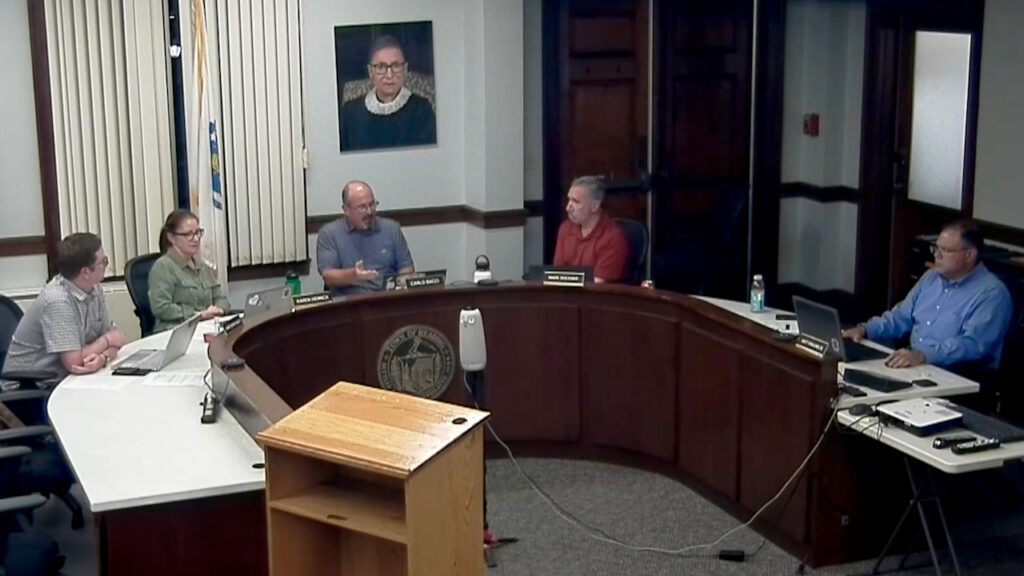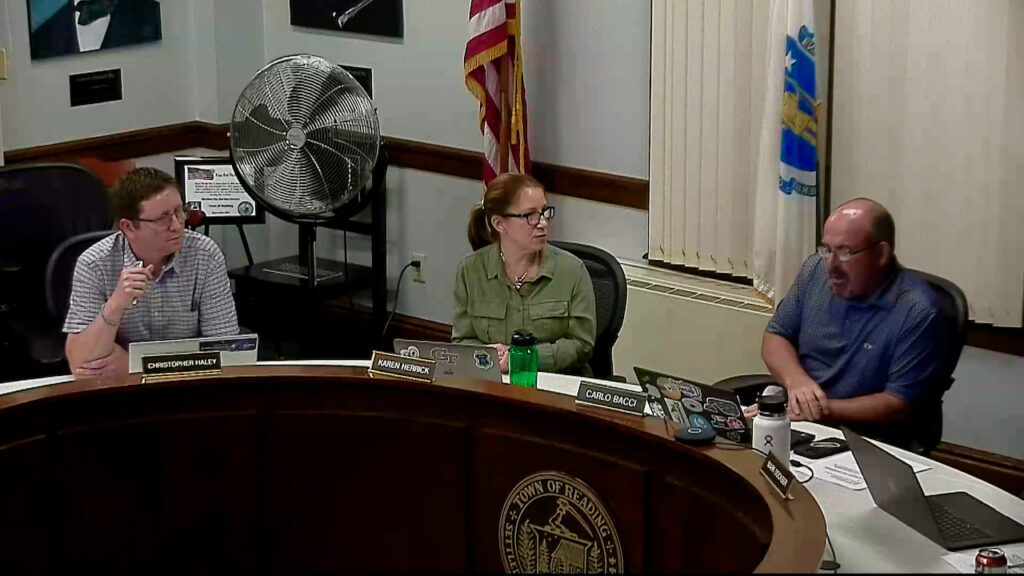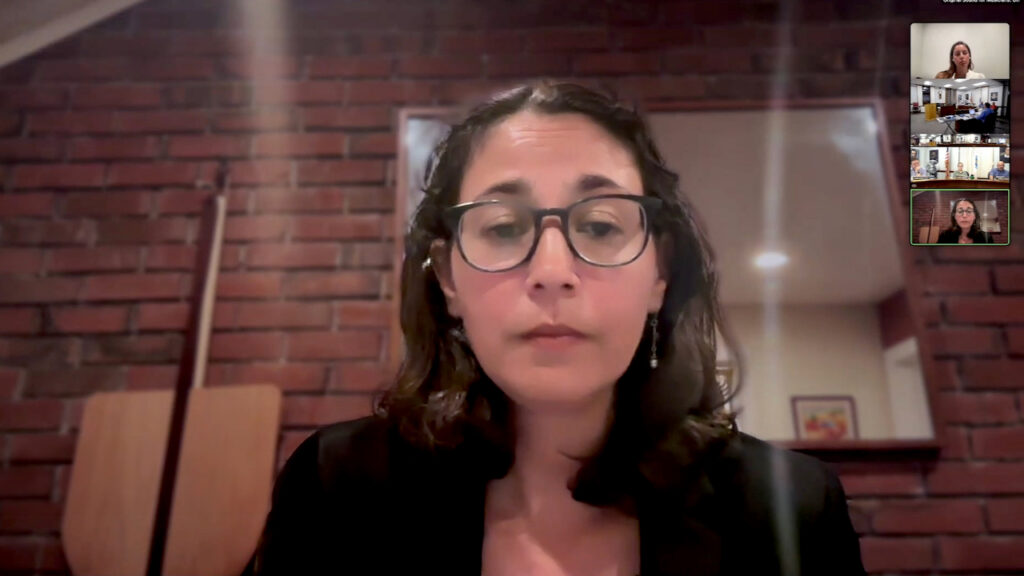Open Meeting Law Complaint

Reading, MA — After an executive session during which the Select Board approved and voted to make public executive session minutes from June 4, the board discussed and responded to two additional open meeting law (OML) complaints filed against them. The first, filed by John Lippett, alleged that Chair Carlo Bacci violated OML when he spoke with former chair Jackie McCarthy prior to the Town Manager selection vote, as Bacci allegedly knew how Select Board member Chris Haley was going to vote on the issue. Lippett, in his OML filing, suggests that this knowledge indicates that Bacci and Haley had had a conversation prior to the call, thus creating a violation.
In discussion, Haley stated that a discussion with Bacci never occurred and that accepting Lippett’s suggestion “on face value is completely unwarranted.” Town Counsel Ivria Fried added that typically, in cases such as this, the Attorney General will accept the statement of a Select Board member unless there is additional information available. Bacci also declared that there was no violation in the instance cited by Lippett.
Select Board member Karen Herrick responded, wondering why the board was seemingly ready to accept Bacci’s and Haley’s statements while disregarding hers when she stated that she had not been in violation on the prior OML complaint against the board.
“Sometimes a Select Board member is going to be believed, sometimes they are not,” Herrick stated.
Select Board member Mark Dockser also suggested that the board consider treating each of these types of cases consistently when they arise. The board voted 4-0-1 to authorize Town Counsel to respond, stating no violation occurred. Herrick abstained from the vote. “I was not offered this courtesy,” Herrick declared.

Dan Dewar filed the second complaint regarding the response to his initial complaint in which Herrick stated, “I did not speak to any Select Board member about the Town Manager selection vote.” Dewar alleges that Herrick did, in fact, communicate with McCarthy via text message during the time in question. The text messages referenced were attached to the complaint. The texts came to light as a result of a public records request. Dewar also alleged that a conversation between Linda Snow Dockser and McCarthy constituted a serial communication from Dockser regarding the town manager selection.
Fried broke the complaint down into three parts, the first regarding Snow Dockser’s conversation. During her public comment, Snow Dockser explained that her conversation with McCarthy had nothing to do with the town manager selection and that she and her husband do not discuss these issues as they are careful about OML concerns. Fried shared that spouses do not lose the right to speak to elected officials and that, in her opinion, there was no violation.
The second part involved Mark Delaney, McCarthy’s husband, sharing with Herrick how three members were going to vote. In Fried’s opinion, this is a reiteration of the previously admitted OML violation filed by Bill Brown.
The third part dealt with the text messages sent between Herrick and McCarthy. Fried suggested that they warranted discussion by the board. Bacci opened the discussion by stating that Herrick lied to the board when she stated that she had not spoken to McCarthy regarding the town manager search. Herrick took exception, stating that she did not lie and that she considers Bacci’s statement to be “just antagonistic.” When questioned by Bacci, she replied that he mischaracterized the nature of her conversation with McCarthy.
When a particular text mentioning one of the Town Manager candidates was referenced, Herrick responded that she never told McCarthy who to vote for and that neither she nor McCarthy believed the texts were related to the town manager vote. Haley then accused Herrick of playing semantics with the idea that text messages are not technically “speaking” with a person. “The text messages contradict what you said,” Haley declared.
After several minutes of banter back and forth as to whether or not the texts are a conversation and whether or not they were deliberated on the town manager selection topic, Fried was asked for her opinion on whether the texts could be considered a conversation. Fried offered that what is written in the texts could potentially “cross the line” and that the Attorney General would likely find that the texts are deliberation. She continued to share that deliberation does not have to be oral communication but that text messages and emails can be considered deliberation.
Fried added that two members of a five-member board, on their own, cannot violate OML. In her opinion, on their own, the text messages do not violate OML. Only when looked at in the bigger picture, if they are deemed to cross the line, does an issue occur, as the board has already admitted to in the Bill Brown complaint.

Based on Fried’s counsel, Haley asked if Herrick would admit to a violation. Herrick replied that she would take Fried’s counsel under advisement but that she already had answered the question. When Haley pressured her to answer again, Herrick simply shared that she was going to stand by her statement.
Select Board member Melissa Murphy noted that she agreed with Fried that this violation fell under what was already admitted to and suggested that the board needs additional OML training. Bacci stated that he was “disappointed” that the text messages were not included in past discussions.
Ultimately, the board voted 5-0 to authorize Fried to respond that the board recognizes that between January 31 and February 4, various members of the Select Board communicated outside an open meeting. The board has recently come across new information that additional text messages were sent during this period that were not talked about or disclosed in the past. As a board, they are committing themselves again to compliance with the open meeting law, and the board will seek additional training from Town Counsel or the Attorney General’s office on the issue.
Potential Select Board Reorganization
The final topic for the evening was to discuss a possible board reorganization due to the new information regarding the text messages, specifically whether or not to remove Herrick as vice-chair of the board. Bacci shared that he put this on the agenda due to his frustration over the last several months, especially given that the new information was not disclosed earlier. Dockser shared his opinion that a discussion about how they will work together must happen before any reorganization discussion.
“If we can’t have a discussion, if we can’t have a set of rules that we are all going to comply with, then it’s really hard to have a discussion. It’s one group exerting their will, and that’s the way it is going to be,” Dockser stated. “That is not what the town is looking for.”
Bacci stated that he agreed but that “it has been a circus since February 6.” He then referenced a timeline of events leading to McCarthy’s resignation. “When I look at this timeline, it is very one-sided,” Bacci stated. He then shared that he tried to have Dockser hold Herrick accountable for being late and on her phone during meetings and that Dockser had chosen not to. Herrick took exception, stating that Bacci’s assertions were not true, then called for a motion to adjourn. The board voted 3-2 to adjourn, with Haley and Bacci in dissent.
The Select Board adjourned at 9:45 pm.
